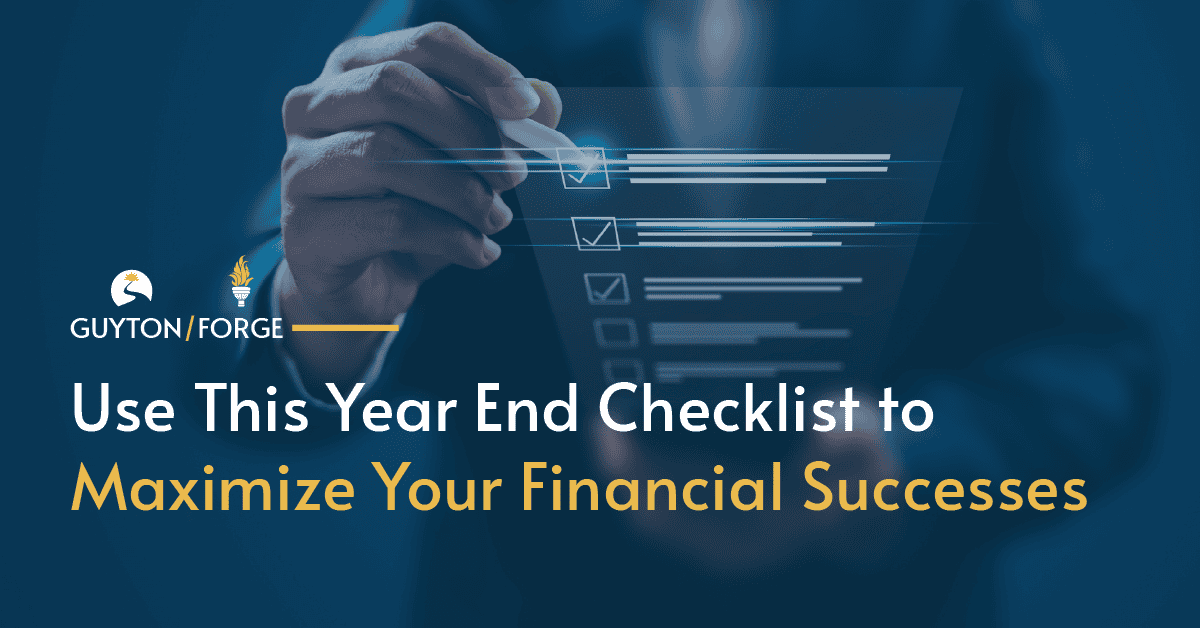Here at Guyton Forge, we hear so many people ask questions about how to get started with financial planning. Commonly, we hear things like: Am I doing the right thing with my money?, When should I start working with a financial advisor?, and What should I do now to ensure my financial success in the future? Therefore, we thought it would be helpful to share some of the questions we hear most frequently about taking the first steps in financial planning. These include:
When’s the right time to start with an advisor?
If you’re thinking about it, you should probably be exploring it! It’s wise to start working with a trusted financial advisor as soon as possible – ideally when you get your first job and start making decisions about what you’re going to do with your savings. We’ve seen many recent college graduates who think they should put all their savings into a 401K, but that won’t help them for 30 years. They’ll be locked out of that money, and can’t use it to buy the things they’ll need before they reach retirement age, like a house, car, etc.
Many people simply don’t know how to save money or set themselves up for financial success. They need to learn how to save money, and how to set up the basic infrastructure for their finances. People may try to Google this information, but there are so many opinions on the Internet, and you don’t want to follow the wrong advice. You’re much better off going to a financial advisor and getting advice right from the horse’s mouth. Also, since this isn’t a “one size fits all” endeavor, your financial advisor will consider your specific circumstances – your financial goals, income, needs, etc. – to create a customized plan that works for you and helps set you up for success.
What are some common “first things” to think about?
An important first action is setting up an initial conversation with a financial advisor to make sure that you personally connect with them. You need to like and trust them, so you can form a successful, long-term relationship.
Once you find a financial advisor that you like, one of the first steps they’ll take with you is to look at your cash flow and savings system. Keep in mind that most people don’t have a savings system. They get their paycheck, spend money, and try to save what’s left. That’s approach doesn’t set you up to maximize your successes.
It’s important to set up a proper financial infrastructure. For instance, you’ll want to automatically and passively save money each month, setting up a certain amount to routinely transfer to specific accounts. Some people deposit their whole paycheck into their savings account, and then just transfer a certain budgeted amount to spend on their monthly expenses. Your financial advisor can help you learn a new way of budgeting, where you choose how much you’ll spend and understand what your spend rate can – and should – be. That way, you’re not spending more than you’re earning. Frequently, as people progress in their careers and make more money, they spend more money, buying cars, houses, and toys. Instead, when you get a raise, work with your financial advisor to reevaluate how much of that increased earnings you’ll save vs. spend.
Am I on the right track?
This is such a common question, as everyone wants validation that they’re “doing it right”. A good way to determine whether you’re on the right track is to evaluate what percentage of your income you’re saving – striving for at least 15%. Once you hit 15%, try to save 20%. Build good savings habits early so you don’t have to take more risks later on in your life – that’s not a formula for success. And remember, this doesn’t just magically happen – you need to set up the infrastructure. Don’t automatically funnel all your savings into a 401K, which locks you out of your money until you’re older. Have accessible savings, as well, so you can use your money to buy what you need, whether that’s a car, an unexpected home repair, or something else.
In addition to looking at your saving system, ensure that you have the proper protection vehicles in place. For instance, did you design your auto insurance correctly? If you’re in a car accident, you want to be protected so you can’t get sued and potentially lose your hard-earned savings. We call it blocking and tackling – making sure that other people don’t get access to your money. Also, have systems in place to service your debts, like your student loans and mortgage. The concept of having a basic infrastructure is so effective, but many people just don’t think of putting this in place.
How should I deal with big (and expensive) life changes?
It’s essential to build a plan that’s fluid based on what’s happening in your life, and your financial advisor can help you accomplish this. Your goals and accounts at age 22 maybe very different than what you focus on in your 30s. Collaborate with your financial advisor to adjust the plan to accommodate your milestone moments, like having the liquidity you need to buy a house and pay for your children’s college education.
Consider life events, accessibility, tax treatments, and having a general purpose around your accounts. You’ll, ideally, have short-term, mid-term, and long-term money to serve you well over your lifetime. When you have a long-term relationship with your financial advisor – like we have with our clients – they can coach you through each life stage. That’s a really fun part of our jobs. We get to see our clients go through these life events and enjoy their financial successes.
What parts of the plan are commonly overlooked?
A lot of people overlook having money that’s accessible to them. There’s such an emphasis on retirement savings, but so much happens between age 30 and retirement.
Also, be sure to have the right levels of protection. Some people may look for the least expensive auto insurance that’s available, for instance, but certain protections are important to have. In NH, where auto insurance isn’t required, it’s critical to have uninsured and underinsured coverage in case you’re in an accident with someone whodoesn’t have proper coverage. Have a protection portfolio, with all necessary legal documents in place. If you have a trust, update the beneficiaries so everything flows into the trust and doesn’t have to go through probate court. Make sure you have the right amount of life insurance coverage. Most people don’t. We have an exercise that seems grim, but it works really well. We’ll virtually kill you off so you see how the money would flow after your death. Once clients get over the initial shock of this concept, they find it so helpful. They can see what happens in a variety of mock scenarios.
Also, think about tax treatments. The way that you save money – and the tax treatments you use – are critical in your early earning years and determines how much drag you’ll have later in life. We help our clients make sure they do good long-term tax savings. If, right out of college, you’re earning $50K, consider your tax deduction on your 401K. Fast forward 40 years – you’re making more money, experiencing inflation, and paying higher taxes taking money out. So, instead of paying taxes when you were in the 20% bracket, now you’re paying in the 30% bracket. Include company match and other potential benefits to balance out. Think through your long-range tax planning, and set yourself up so that you’re keeping more money in your pocket vs. giving it to the government. In fact, we’ve never met anyone who wants to pay more taxes than they have to!
How do I find the right financial advisor?
Find someone that you mesh with and trust. Develop a long-term, personal relationship with your financial advisor, which gives you continuity in your plan. Work with someone who provides that personal touch, explains things well, and makes you feel comfortable. It’s like dating. Someone can look “great on paper” with the skills and experience that you’re looking for, but if there’s no chemistry, it won’t work. You need to like the person and trust them.
If you’re looking for a financial advisor, let’s talk about how the Guyton Forge team can help you achieve – and exceed! – your financial goals.
At Guyton-Forge, we offer the experience of a big firm with a small town feel. We customize our approach (and our advice) to meet each client’s specific situation, needs, and goals. We’re proud to do things differently – it’s part of what sets us apart as a friendly, high touch practice. We offer extensive experience and knowledge, creating strong, long-term relationships with our clients.
2024-179682 Exp 8/26






